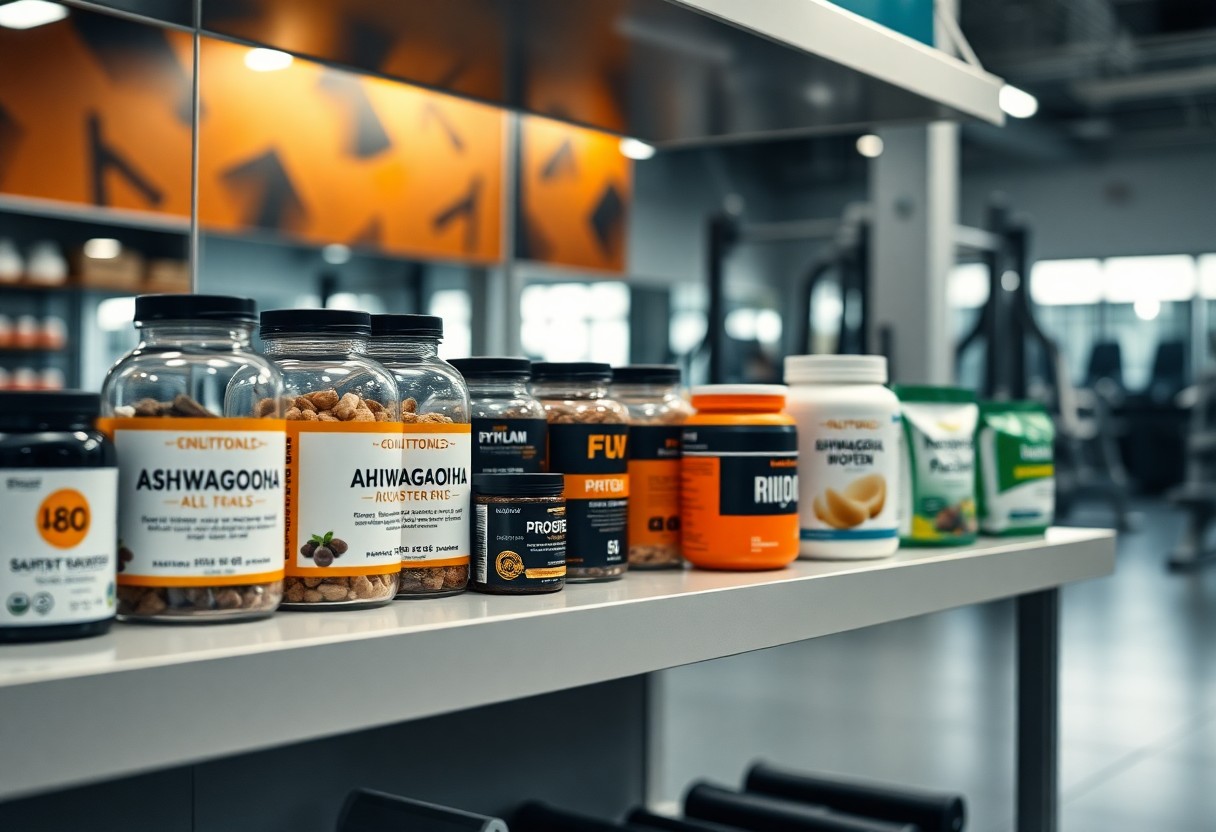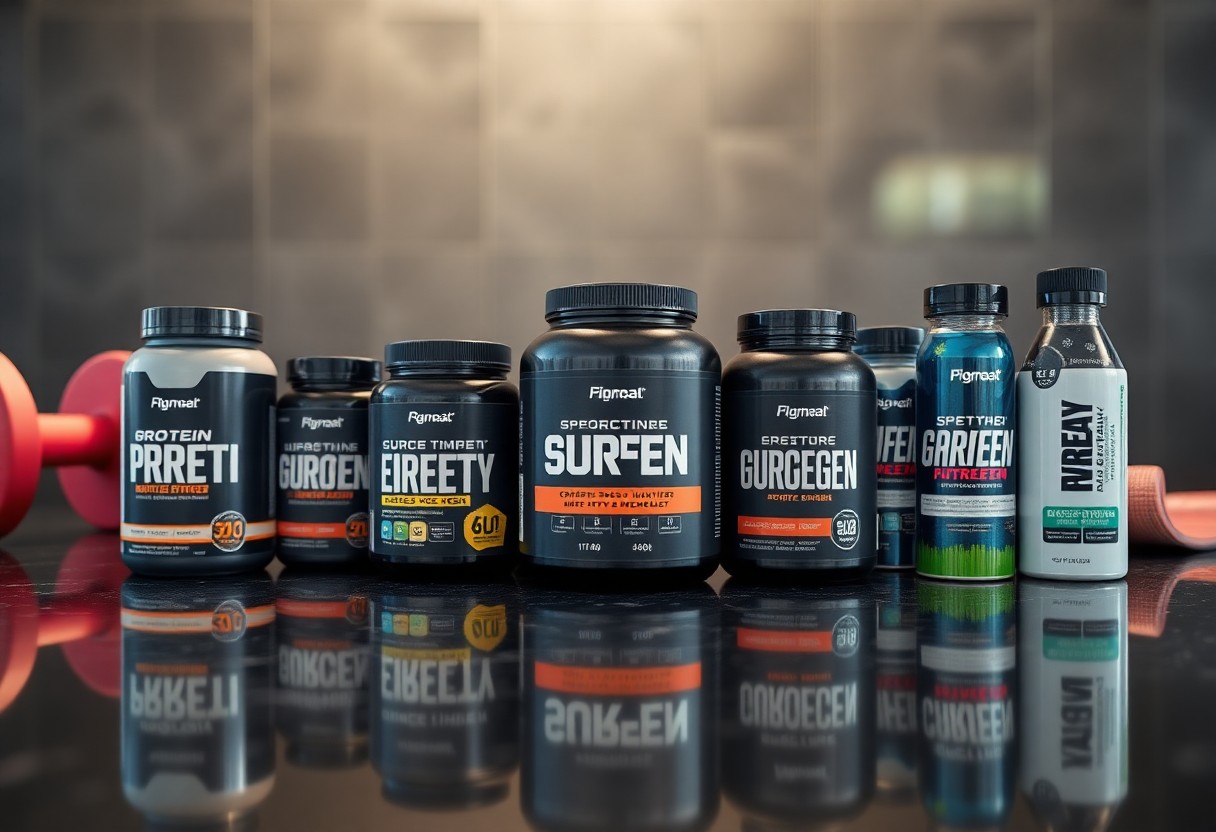Sports performance greatly relies on the right nutrition, and for premium sportsmen like you, selecting the best supplements can enhance your training and recovery. Understanding the various types of sports nutrition supplements available—from protein powders to creatine and branched-chain amino acids—can help you reach your fitness goals more effectively. In this blog post, we’ll investigate into the vital supplements that can elevate your performance, how to incorporate them into your routine, and the science behind their benefits.
Key Takeaways:
- Sports nutrition supplements are designed to enhance performance, aid recovery, and support overall health for premium athletes.
- The selection of supplements should be based on individual needs, training goals, and specific sports discipline to ensure maximum effectiveness.
- Quality matters; look for third-party tested products to ensure purity and potency, minimizing the risk of contaminants.
- Timing and dosage of supplements can significantly impact their benefits; athletes should consider pre- and post-workout supplementation strategies.
- A balanced diet cannot be replaced by supplements; they should complement whole foods for optimal nutrition and health.
The Essential Role of Nutritional Science in Elite Sports Performance
Nutritional science serves as the backbone of elite sports performance, directly influencing your energy levels, recovery processes, and overall physical capabilities. Your body requires a blend of macronutrients and micronutrients to not only sustain high-intensity training but also to repair and strengthen muscles post-exercise. By integrating scientific insights into your diet, you enhance your performance, optimize recovery, and minimize injury risks. This strategic approach ensures that fuel is not merely about quantity but also quality, ultimately setting you apart in your competitive pursuits.
Breaking Down Macronutrients: The Fuel for Champions
Your diet’s macronutrient balance—carbohydrates, proteins, and fats—plays a pivotal role in fueling your athletic endeavors. Carbohydrates provide immediate energy during workouts, while proteins are crucial for muscle recovery and growth. Healthy fats support sustained energy and hormone production, crucial for maintaining peak performance levels. Understanding the appropriate ratios of these macronutrients for your specific training regimen can lead to enhanced endurance, quicker recovery, and improved overall fitness.
Micronutrients and Their Impact on Recovery and Endurance
A comprehensive focus on micronutrients—from vitamins to minerals—can significantly elevate your training outcomes. These crucial nutrients support metabolic functions, immune health, and inflammation control, all while aiding your body’s natural recovery processes. A well-rounded intake of micronutrients is especially vital for athletes undergoing intense training, which often leads to increased nutrient demands.
For example, vitamin C and zinc are crucial for immune support, helping you stay healthy during grueling training cycles. B vitamins, like B12 and folate, play a role in energy production, allowing you to sustain effort during extended sessions. Magnesium aids muscle function and recovery, while iron supports oxygen transport in the blood, crucial for stamina and endurance. You must prioritize a diet rich in these micronutrients to maximize your training effectiveness and minimize fatigue, thereby enhancing performance over time.

The Cutting-Edge Supplements Transforming Athletic Performance
Among the innovative advancements in sports nutrition, cutting-edge supplements stand out as game-changers for athletes. These products are meticulously formulated with scientific research backing their efficacy, allowing you to push your limits further. From enhancing endurance to optimizing recovery, these supplements are tailored to elevate your performance and give you a competitive edge.
Protein Powders: Beyond Building Muscle
Protein powders have evolved into multifunctional supplements that provide far more than just muscle-building benefits. By incorporating peptides, amino acids, and complex carbohydrates, they now aid in muscle recovery, immune support, and even improving endurance. Customizing your protein intake with specific blends can help you achieve your fitness goals more effectively than ever before.
Creatine and its Controversial Benefits
Creatine is often hailed for its power-enhancing properties, yet its use remains hotly debated among athletes. Although many athletes report improved strength and explosive performance, some question its safety and necessity for peak performance. Studies indicate that creatine supplementation can lead to significant strength gains, particularly in high-intensity, short-duration activities like sprinting or weightlifting.
Independent research shows that creatine users experience a 5-15% increase in strength over non-users, supporting its effectiveness in explosive sports. Despite initial concerns around water retention and muscle cramping, most athletes tolerate creatine well. With proper cycling, it can be a valuable addition to your training arsenal, assisting in muscle recovery and reducing the risk of injury. Stepping beyond the debate, utilizing creatine wisely may allow you to tap into your full potential as an elite athlete.

The Power of Adaptogens and Natural Enhancers
Integrating adaptogens and natural enhancers into your routine can amplify your performance by balancing stress levels and boosting energy. These potent compounds work to stabilize cortisol, promote mental clarity, and enhance physical endurance, making them invaluable tools for any serious athlete. With a growing body of research supporting their efficacy, the incorporation of these supplements into your regimen can lead to optimized recovery and peak performance. Adapting to physical and mental strains is necessary, and these natural allies are here to help you reach your goals.
Unlocking the Potential of Rhodiola and Ashwagandha
Rhodiola and Ashwagandha are two adaptogens that can significantly impact your athletic performance. Rhodiola is known for reducing fatigue and enhancing endurance, enabling you to push through intense training sessions. Meanwhile, Ashwagandha can lower stress and anxiety levels, allowing for better focus during competitions. Together, they create a powerful combination that supports both physical and mental resilience, making your training more effective.
The Science Behind Beetroot Juice and Endurance
Beetroot juice stands out in sports nutrition for its ability to enhance endurance performance effectively. Rich in nitrates, beetroot juice helps improve blood flow and oxygen delivery to muscles, which can translate to better overall performance. Studies suggest a marked increase in time-trial performance and a reduction in perceived exertion, allowing you to train harder and longer. This makes beetroot juice a popular supplement among elite athletes aiming to achieve their peak potential.
The science behind beetroot juice centers on its high nitrate content, which is converted into nitric oxide in the body. This process relaxes and dilates blood vessels, leading to improved circulatory efficiency. Research indicates that athletes consuming beetroot juice can experience a performance boost, with some studies showing an increase in time-trial outcomes by as much as 3%. By optimizing oxygen uptake and enhancing endurance, incorporating beetroot juice can be a game-changing addition to your pre-competition supplement stack.
Navigating the Complex Landscape of Safety and Efficacy
Determining which sports nutrition supplements are both safe and effective can feel overwhelming, given the myriad of options available on the market. You encounter a mix of marketing messages, scientific claims, and anecdotal evidence, all of which can cloud your decision-making process. Engaging with credible sources such as peer-reviewed studies, reviews from nutrition experts, and athlete testimonials can guide your choices, ensuring you prioritize supplements that enhance your performance while supporting your overall health.
Understanding Third-Party Testing and Product Integrity
Opting for products that undergo third-party testing offers assurance of their purity and potency. When you choose supplements validated by independent organizations, you can trust that what’s on the label matches what’s in the bottle, minimizing the risk of contamination or incorrect dosages. Certifications from reputable entities help streamline your choices, protecting you from products that deliver less than promised or potentially harmful ingredients.
The Risk of Banned Substances: A Cautionary Tale
Banned substances pose a significant risk in the world of sports nutrition, with some supplements unintentionally containing them. Scandalous instances, such as high-profile athletes facing suspensions due to positive drug tests from contaminated supplements, highlight the importance of vigilance in what you consume. One infamous case involved a professional cyclist who lost his career over traces of a prohibited substance found in a seemingly harmless protein powder.
This cautionary tale isn’t an isolated incident; it underscored the need for rigorous diligence when selecting supplements. The World Anti-Doping Agency (WADA) maintains a comprehensive list of banned substances, and maintaining awareness of this list is paramount for any serious athlete. Many supplement manufacturers have implemented quality control measures, but accounts of severe consequences stemming from negligence remind you to always verify product labels and seek third-party certifications. Engaging with reputable brands while employing safe practices allows you to enhance your athletic performance without jeopardizing your career or integrity.
Customizing Your Supplement Regimen for Optimal Results
Crafting an effective supplement regimen requires a personalized approach that considers your unique needs and lifestyle. Fine-tuning your choices based on factors such as workout intensity, recovery needs, and dietary restrictions allows you to maximize the benefits of sports nutrition supplements. By taking a systematic view of what you aim to achieve and your current nutritional status, you can pinpoint the elements that will enhance your training and performance.
Individual Goals: Tailoring Supplement Choices
Your specific goals dictate the supplements you should prioritize. For instance, if muscle gain is your aim, protein powders, creatine, and branched-chain amino acids should feature prominently. Conversely, if endurance performance is your focus, beta-alanine and electrolyte blends may be more beneficial. Assessing your objectives will guide your supplement selections and help you avoid unnecessary products.
Timing and Dosage: When and How Much to Take
Timing and dosage play pivotal roles in the effectiveness of your supplement regimen. Consuming certain supplements like protein and amino acids immediately post-workout can significantly enhance recovery and muscle synthesis. Establishing specific windows for intake, such as pre-workout or during training, can optimize nutrient absorption. Furthermore, adhering to recommended dosages ensures that you receive maximum benefits without over-supplementing.
For optimal results, aim to take protein supplements within 30 minutes after your workout. This timeframe is often referred to as the “anabolic window,” where your muscles are primed to absorb nutrients effectively. Creatine should typically be loaded in a split dosage over five to seven days before transitioning to a maintenance dose. For endurance athletes, electrolytes can be consumed during extended workouts to maintain hydration and electrolyte balance. Adjusting these timings based on your exercise regime and recovery needs will enhance your performance sustainably. Maintaining a consistent schedule can further support your body’s adaptation to training and recovery cycles.
To wrap up
Following this, you now understand the importance of sports nutrition supplements for premium sportsmen. These supplements can enhance your performance, support recovery, and optimize your overall well-being. By choosing high-quality products tailored to your specific needs, you can ensure that your body receives the vital nutrients to thrive in your sport. As you integrate these supplements into your training regimen, always stay informed and consult with professionals to maximize their benefits and align them with your individual goals.
FAQ
Q: What are sports nutrition supplements and who should use them?
A: Sports nutrition supplements are products designed to enhance athletic performance, recovery, and overall physical health. They are suitable for premium sportsmen, athletes, and fitness enthusiasts who engage in rigorous training and wish to optimize their nutrition. These supplements can help in areas such as muscle building, endurance, energy levels, and recovery times.
Q: What types of sports nutrition supplements are most beneficial for athletes?
A: There are several key types of sports nutrition supplements that athletes often find beneficial. These include protein powders (for muscle recovery and growth), amino acids (to aid muscle repair), creatine (to improve strength and power), and branched-chain amino acids (BCAAs) for energy during workouts. Additionally, vitamins and minerals can support overall health and functioning during intense training.
Q: Are there any side effects associated with sports nutrition supplements?
A: While many sports nutrition supplements are generally safe when used as directed, some individuals may experience side effects such as gastrointestinal discomfort, allergic reactions, or interactions with medications. It is important for athletes to consult with healthcare professionals or nutritionists before starting any new supplement regimen to ensure safety and effectiveness tailored to their individual needs.
Q: How should sports nutrition supplements be incorporated into an athlete’s diet?
A: Incorporating sports nutrition supplements into an athlete’s diet should be based on their specific goals, training intensity, and dietary preferences. It’s advisable to use supplements to complement a well-balanced diet rich in whole foods. Athletes should consider the timing of intake around workouts for maximum benefit, such as consuming protein shortly after training for recovery and replenishing glycogen stores with carbohydrates.
Q: What should athletes look for when choosing sports nutrition supplements?
A: When deciding on sports nutrition supplements, athletes should look for high-quality products that have been third-party tested for purity and effectiveness. They should check for transparent labeling that indicates the ingredients and their concentrations. It’s also wise to choose supplements that align with specific dietary needs (e.g., vegan, gluten-free) and to avoid those with artificial additives or fillers.

